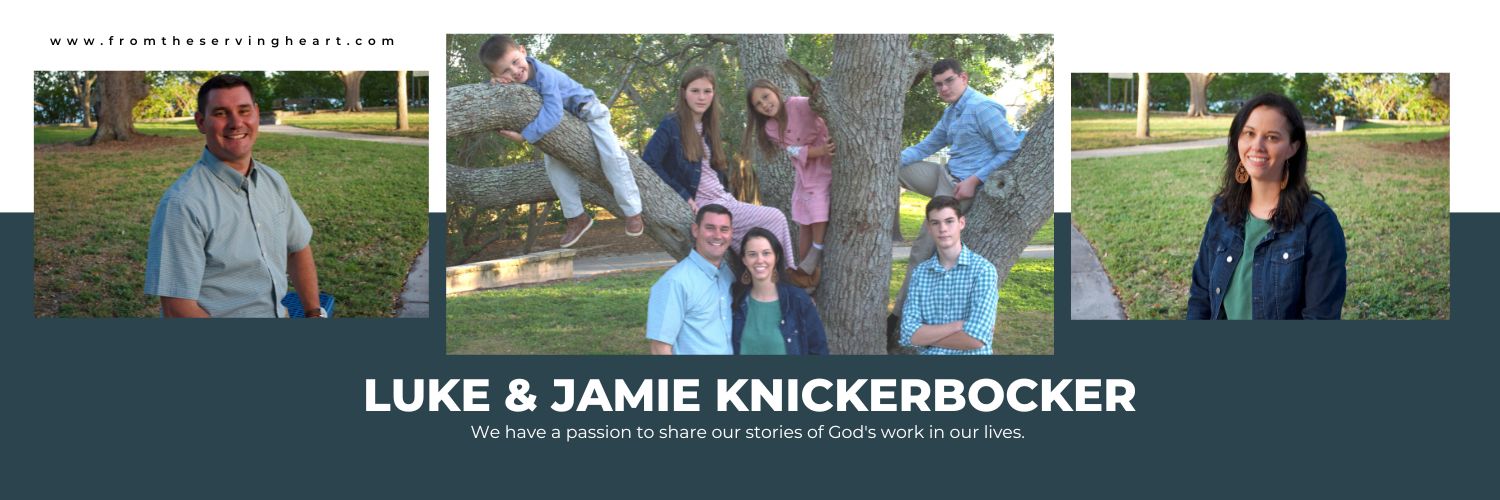
All I wanted was to locate some chums (eyeglass accessories) for a missionary friend that I was preparing to visit in Brazil. I was walking around my local Walmart in South Tampa, Florida and saw a Muslim lady with a hijab stocking some shelves in the grocery aisle. I wandered in another part of the store and heard a couple speaking French to each other. I asked another worker where I could find the strings to hold eyeglasses, but she only spoke Spanish. Then I found another Vietnamese employee who spoke some English and tried to help. Finally, a black lady who spoke perfect English pointed me in the right direction!
C’mon, I’m not supposed to be in a foreign country until next week when I go on a mission trip!
Why can’t they just learn English?
Now this is not an abnormal situation, and you may have found yourself in this scenario. What is your reaction? In your secret thoughts, do you mutter, “What country am I in?” or “Why doesn’t everyone else speak English?” This is natural, and from a social or political perspective, it may cause some angst. Maybe you feel like outsiders are infringing on your personal space and now you are our of your comfort zone.
Welcome to the missionary life!
As a veteran missionary, I know what it’s like to be a foreigner in an Asian country. When our family moved to Kathmandu, Nepal, we expected everything to be different – and it was! We were the outsiders and looked at by others as the weird ones. Little things we did were scoffed at such as drinking water with ice in it! “Don’t you know that can give you a cold?” some would say. Or we were scolded for not having our newborn wear a hat all the time. (Yes, what horrible parents we were!)
We would just laugh about the different “old wives’ fables”.and superstitions of others who didn’t think like us.
But when we are back home in OUR own country, there are certain things that we expect to remain the same. But things have changed and continue to at an increasing speed! Now migrant workers are over-populating our land and we may as well rezone South Florida as another Latino country! Last week, a missionary came by our church and informed us that Nashville was home to about 40,000 Kurds who are refugees from Iraq. About 60,000 Somolis live in Minneapolis. Over 80,000 Brazilians live in New England!
Every major city has multiple ethnicities living in clusters around their suburbs.
Who lives in Texas?
We know that many undocumented illegal aliens are streaming over our American borders continuously from Central and South America. But did you know there are various ethnic populations surrounding the Dallas/Fort Worth area? On UPGnorthamerica.com, I found the following statistics:
6,500 Kurds in South Arlington, Texas (Islam from Iraq)
12,285 Pujabi Sikhs in Irving, Texas (Sikhism from India)
37,791 Gujarati in Plano, Texas (Hinduism from India)
6,355 Bangladeshis in Irving, Texas (Islam from Bangladesh)
43,274 Indo-Pak Muslims in Plano, Texas (Islam from Pakistan)
11,319 Iraqi Arabs in Richardson, Texas (Islam from Iraq)
10,311 Palestinian Arab in Richardson, Texas (Islam from Israel)
68,023 Indian Hindi in Frisco, Texas (Hinduism from India)
5,671 Lebanese Arab in Richardson, Texas (Islam from Lebanon)
13,939 Persian in Plano, Texas (Islam from Iran)
5,467 Thai in City Place, Texas (Buddhism from Thailand)
This is only an example of one area! Go here to learn about 120 unreached people groups living in America!
What are we doing about it?
What are local churches doing to help these immigrants and refugees? There are literally hundreds of churches in this same area of Texas. How many churches are being “missionary minded” and engaging them for the Gospel’s sake? Our government has a system in place to have Americans sponsor refugees. You can sign up and meet them at the airport and assist them as they get integrated into our society. Even liberal politicians seem to want to show compassion on the unfortunate. But what are we as Christians doing in response?
It is not okay to willingly be ignorant. Get informed and get involved to be a missionary next door!
Many families are coming from countries that are otherwise restricted to traditional missionaries. Another place where foreigners can be found are in our universities. At the University of South Florida located in Tampa are more than 5,000 international students from 145 countries! The website for USF boasts of it being “one of the most diverse campuses in the U.S.!”
Why can’t we Christians have this same enthusiasm to have the opportunity to reach our world through reaching our neighbors?
A land of immigrants
The idea of immigrants coming to America is not a new trend. But perhaps it just feels more diverse than 50 years ago. America has always been known as “the melting pot” with many immigrants coming to the land of opportunity with the hope of a better future. In fact, many of our forefathers came as pilgrims seeking respite from tyrannical leaders desperately looking for a place to freely worship God.
Perhaps, we Christians need to lay down our patriotic glasses that we wear while looking down our nose on those who are settling on our lands and put on our missionary lenses. We are truly in a time with unparalleled opportunities to reach the world’s nationalities living within our own borders. We are happy to send missionaries across the sea “to reach the lost at any cost”; but we shun the cost which affects my personal comforts!
Yes, foreigners coming to America may be bringing their religion that goes against my belief system! But greater is He that is in you than he that is in the world! This is our opportunity to shine the light of Jesus, not retreat with our few friends at church and complain about this lost world that’s getting worse by the day. Let us rise up to the unprecedented possibilities in front of us, befriend the foreigner, and introduce them to Jesus Christ!
Right here, right now
Perhaps you have a neighbor who is from another country. They speak a different language with their children, wear different clothing, observe different customs, and follow a different religion. What is your reaction? Are you prepared to be a missionary and talk to them? Let me challenge you to purposely equip yourself to engage in the cause of world evangelism starting right here, right now!
After all, Jesus told a whole parable about the Good Samaritan to help the Jewish people cross the cultural barrier to learn to love those different from them. The religious priest and Levite refused to help a hurting man who had been robbed and wounded. This revealed their hypocrisy. They would rather talk about God and teach the laws instead of actively love their neighbor. But it was a Samaritan who showed kindness to the wounded Jew. Culturally that was not expected. But every Christian must be prepared to do the unexpected and love like Jesus did.
Are you a good neighbor?
Here are a few practical things you may do to be a good neighbor.
1. Introduce yourself
At minimum, show some charity. When you meet someone who obviously is not the same as you, introduce yourself to them – quit ignoring them. Ask them what their name is and inquire about where they are from and what language they speak. This shows that you actually care about them as a human being. Learn a couple phrases in their native tongue. Smile! Trying to say some words in a different language will make you both smile! True charity is sacrificing our own preferences to reflect the nature of our Lord Jesus Christ. This is something non-believers are not accustomed to, yet need to be introduced to. But it will require you to step out and make the first move!
2. Invite your new friends into your life
Secondly show some hospitality. When our family lived in Nepal, we would invite our new friends to our home to try an American meal! Invite your new friends into your house. Share some coffee or tea and be a friend by asking lots of questions. This is how you can show interest in their life. By the way, before they will want to hear what you have to say about your God, they need to know that His followers really care about them. I would suggest that before you give them Gospel literature, take time to naturally talk about their religion. Find out what they believe. Ask questions. You don’t have to have a response or answer for everything they say – especially when you disagree. When you ask them questions, you open the door for them to return the favor and you have earned the right to share with them your personal journey of faith.
3. Invest your time in others
Finally, show some generosity. It is way easier to give money to your church to support foreign missionaries. But you must be willing to do what you are sending “foreign missionaries” to do. That is, you must include people who are different into your life and busy schedule. Money is not the answer to reaching our world for Christ. Rather, it is through ordinary Christians like you and I building relationships and loving people. Offer to share your time to practice English with foreigners who are now your neighbors. I remember doing this with a Buddhist monk in Nepal. Soon after, we were studying the Bible together!. He would come to our house and eat with us and play games with us. We would have tea with him at his monastery. If you are able to visit the country of your neighbor’s origin, it will give you a common bond showing you are truly interested in their people and culture.
Remember, as Christians we are foreigners in this world. Just like Abraham, we are looking for a city whose builder and maker is God. We have hope because we know God in a personal way. As the Apostle Paul said, we are no more strangers and aliens to God. We have been welcomed into the family of God. Why not introduce yourself to your foreign neighbor, invite them to your house, and invest your time in their life? You just might begin to see for yourself what God meant when he wrote, “For God so loved the world.”
Watch the video below to learn how you may access free resources in a variety of languages that may be shared with friends and neighbors from other countries and religions.
About the author:
Luke graduated from Crown College of the Bible in 2003. He married Jamie in July of 2006. God has blessed them with five children. Together they had the privilege of serving in the pastorate of a Baptist Church in Florida from 2007-2011.
In August of 2011, our family began our journey to serve the Lord as labourers among Unreached People Groups in Asia. We prepared ourselves at Baptist Bible Translator’s Institute in Bowie, Texas. During that time, God directed our path to work among the Tibetan people in the country of Nepal.

In February of 2014, we moved to Kathmandu, Nepal and experienced God’s work of grace and protection upon our family. We had the privilege to serve at the Crown Nepal Bible College. Teaching classes and preaching at youth conferences was a great opportunity for our family. We also were able to assist in outreaches to villages of the Tamang and Gurung people.
In 2021, we moved to Tampa, Florida. We currently are serving in our home church Southside Baptist Church and teach in the Christian Academy. Luke continues his writing ministry (www.pilgrimoftruth.com) and video messages on his YouTube channel (Pilgrim of Truth). His go



